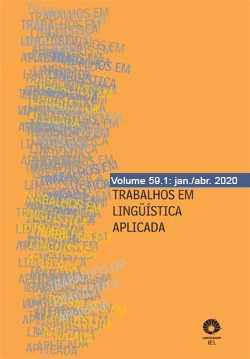Abstract
In the scope of vocational critical language teaching materials, designing lessons that meet professional requirements at public technical high schools committed with the agenda of critical education for citizenship is something that deserves attention. If, on the one hand, the Critical Literacy framework substantiates practices that engage us with social changes (LUKE; FREEBODY, 1997), promote opportunities for developing critical views over dominant ideologies, cultures, economies, institutions and political systems (TILIO, 2013, 2017), and examine our loci of enunciation in order that we unlearn our privileges and learn from the subaltern (ANDREOTTI, 2007); on the other, the lesson materials available for technical high-school courses seem not to take these premises into account, especially the latter. In order to bridge this gap, I designed a lesson unit (Society Matters?), aimed at technical high-school 3rd graders, wherein Maria Lindalva’s autobiography, a subaltern settled landless activist, creates opportunities for discussions over the ideals of work, effort and success that challenge hegemonic-common-sense ideology. Resorting to constructivist bricolage (DENZIN; LINCOLN, 2005) involving her video-autobiography, the language teaching unit, the memories of my pedagogic encounters with learners from 2015 to 2018, and two different lines of interpretation that were recurrently raised throughout, I examined to what extent the interpretations over Maria Lindalva’s narrative reflect and refract neoliberal capitalist ideologies, thus contributing to developing critical posture, as well as to the selection of texts for critical language teaching materials. The results showed the analysis that validates Maria Lindalva’s achievements may be confronted by the viewpoint of her relationship with scarcity (SANTOS, 2017), which favored learners’ developing critical posture; and, finally, that it was possible to take her narrative a step further showing what Maria Lindalva teaches us about selecting texts for critical language teaching materials.
References
ANDREOTTI, V. (2007). An ethical engagement with the other: Spivak’s ideas on education. Critical Literacies: Theories and Practices. v.1, no 1, pp. 69-79, July 2007. Available at: http://www.criticalliteracyjournal.org/cljournalissue2volume1.pdf. Access on: 10 Jan. 2016.
BAKHTIN, M.M. (2011 [1979]). Os gêneros do discurso. In: Bakhtin, M.M. Estética da criação verbal. Mikhail Bakhtin. Trad. Paulo Bezerra. São Paulo: Editora WWF Martins Fontes, 6a ed, pp. 261-306.
BLOOMAERT, J. (2005). Ideology. In: Bloomaert, J. Discourse: a critical introduction. Cambridge: Cambridge University Press, pp. 158-202.
CHUN, C.W. (2017). The discourses of capitalism: everyday economists and the production of common sense. New York: Routledge.
COPE, B.; KALANTZIS, M. (2015). The things you do to know: an introduction to the pedagogy of multiliteracies. In: Cope, B.; Kalantzis, M (org.), A pedagogy of multiliteracies: learning by design. London: Palgrave Macmillan, pp. 1-36.
GRAMSCI, A. (1891-1937). Prision notebooks, trad. Joseph A. Buttigieg and Antonio Callari. New York: Columbia University Press, v. 1, 1992
HALL, S.; O’SHEA, A. (2013). Common-sense neoliberalism. Soundings: a journal of politics and culture, no 55, pp. 8-24. Available at: https://muse.jhu.edu/article/531183/pdf Access on: 21 Sep. 2017.
LOPES, A. C. (2011). Funk-se quem quiser: no batidão negro da cidade carioca. Rio de Janeiro: Bom Texto: FAPERJ.
LUKE, A.; FREEBODY, P. (1997) Critical literacy and the question of normativity: an introduction. In: Muspratt, S.; Luke, A.; Freebody, P. (org.), Constructing critical literacies: teaching and learning textual practices. New Jersey: Hampton Press Inc., Cresskill, pp. 1-17.
MAIA, J.O. (2017). Fogos digitais: letramentos de sobrevivência no Complexo do Alemão/RJ. Tese de doutorado em Linguística Aplicada. Instituto de Estudos da Linguagem, Unicamp, Campinas.
MOITA LOPES, L.P. (2006). Linguística Aplicada e vida contemporânea: problematização dos construtos que têm orientado a pesquisa. In: Moita Lopes, L P. (org.), Por uma Linguística Aplicada Indisciplinar. São Paulo: Parábola, pp. 13-44.
MULICO, L. V. (2019a). Por onde começar? ideologia e hegemonia como pontos de partida para a escrita de uma unidade didática crítica e transgressiva para o ensino de língua inglesa. Mesa Redonda no 4º Congresso Latino-Americano de Glotopolítica. Universidade de São Paulo. São Paulo.
MULICO, L. V. (2019b). Teacher, em que você acredita? desnaturalizando pensares para potencializar o letramento crítico. Mesa Redonda no II Seminário Internacional da Associação Brasileira de Professores de Língua Inglesa da Rede Federal de Ensino Básico, Técnico e Tecnológico. O papel da língua inglesa na rede federal de educação: compartilhando cenários e maximizando êxitos. Universidade Federal Rural de Pernambuco. Recife. Available at: https://e1167e2e-a020-4a3f-99b7-8900918dc34b.filesusr.com/ugd/fb602a_e32bddeecf8346378d6af686b93103e7.pdf. Access on: 9 Jan. 2020.
PENNYCOOK, A. (2001). Critical applied linguistics: a critical introduction. Mahawah, NJ: Lawrence Erlbaum.
ROJO, R.H.R. (2006). Fazer linguística aplicada em perspectiva sócio-histórica: privação sofrida e leveza de pensamento. In: Moita Lopes, L.P. (org.), Por uma linguística aplicada indisciplinar. São Paulo: Parábola, pp. 253-276.
SANTOS, M. (2017). Toward an other globalization: from the single thought to universal conscience. Switzerland: Springer.
SPIVAK, G. C. (1988). Can the subaltern speak? In: Nelson, C. e Grossberg, L. (eds.), Marxism and the interpretation of culture. London: Macmillan Education LTD, pp. 271-313.
TILIO, R.C. (2006). O livro didático de inglês em uma abordagem sócio-discursiva: culturas, identidades e pós-modernidade. Tese de doutorado em Letras. Departamento de Letras, Pontifícia Universidade Católica, Rio de Janeiro.
TILIO, R.C. (2013). Repensando a abordagem comunicativa: multiletramentos em uma abordagem consciente e conscientizadora. In: Rocha, C.H. e Maciel, R.F. (org.), Língua estrangeira e formação cidadã: por entre discursos e práticas. São Paulo: Pontes Editores, pp. 51-67.
TILIO, R.C. (2017) Ensino crítico de língua: afinal, o que é ensinar criticamente? In: Jesus, D.M.; Zolin-Vesz, F.; Carbonieri, D. (org), Perspectivas críticas no ensino de línguas: novos sentidos para a escola. Campinas, SP: Pontes Editores, pp. 19-31.
UNITED NATIONS. (1948). Universal Declaration of Human Rights. Available at: https://www.un.org/en/udhrbook/pdf/udhr_booklet_en_web.pdf. Access on: 17 set. 2019.
VOLOŠÍNOV, V.N. (1926-1930). Il linguaggiocome pratica sociale. Bari: Dedalo libri, 1980.
VOLOŠINOV, V.N. (1930). Marxism and the philosophy of language. New York: Seminar Press, INC, 1973.

This work is licensed under a Creative Commons Attribution 4.0 International License.
Copyright (c) 2020 Trabalhos em Linguística Aplicada


